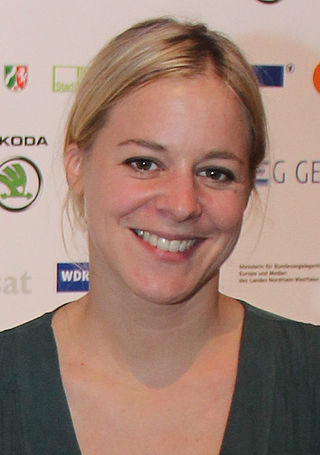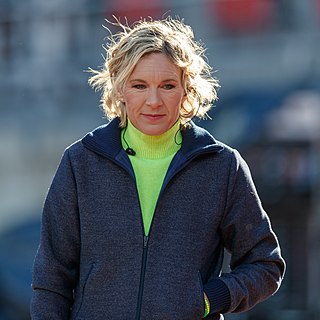
ARD is a joint organisation of Germany's regional public-service broadcasters. It was founded in 1950 in West Germany to represent the common interests of the new, decentralised, post-war broadcasting services – in particular the introduction of a joint television network.

Bayerischer Rundfunk, shortened to BR, is a public-service radio and television broadcaster, based in Munich, capital city of the Free State of Bavaria in Germany. BR is a member organization of the ARD consortium of public broadcasters in Germany.
Alexander Ziegler was a Swiss author and actor.
Bayerischer Fernsehpreis is an award presented by the government of Bavaria, Germany since 1989. The prize symbol is the "Blue Panther", a figure from the Nymphenburg Porcelain Manufactory. The prize money is €10,000.

Ottfried Fischer is a retired German actor and Kabarett artist best known for his role as Benno Berghammer in the popular German TV series Der Bulle von Tölz. He is a supporter of the Social Democratic Party of Germany.
Germany was represented at the Eurovision Song Contest 1983 with the song "Rücksicht", composed by Michael Reinecke, with lyrics by Volker Lechtenbrink, and performed by duo Hoffmann & Hoffmann. The German participating broadcaster on behalf of ARD, Bayerischer Rundfunk (BR), selected their entry through a national final. In addition, BR was also the host broadcaster and staged the event at the Rudi-Sedlmayer-Halle in Munich, after winning the previous edition with the song "Ein bißchen Frieden" by Nicole.

Familie Meier is a German television series. After the six-part Zeit genug, Familie Meier was Bogner's first long-term pre-evening series. He established himself in this genre, which until then had been occupied solely by Helmut Dietl. Cult series such as Irgendwie und Sowieso, Zur Freiheit, Café Meineid and München 7 followed.
Der Kaiser von Schexing is a German television series produced by Bayerischer Rundfunk. It takes place in the fictitious community of Markt Schexing in the district of Ebersberg.
Der Komödienstadel is a German comedy franchise, which consists of a television series, radio plays and stage shows. It was first developed by Olf Fischer as a radio play series which first aired on Bayerischer Rundfunk on 19 April 1954. The television series was launched in 1959. The radio plays featured actors such as Gustl Bayrhammer, Max Grießer, Maxl Graf, Erni Singerl and Ludwig Schmid-Wildy.

Haindling is a German band founded in 1983 by Hans-Jürgen Buchner. The band specializes in Bavarian world music, a mixture of different musical styles such as pop, rock, folk, ambient, jazz and classical music. Most of the songs are written in Bavarian language. Haindling is famous for instrumentals and film scores composed by Buchner. The name of the band derives from the small village Haindling within the town of Geiselhöring in Lower Bavaria.

Bernadette Heerwagen is a German actress. She began acting at the age of 16, and has since co-starred in the 1999 production Der Schandfleck, for which she was awarded the Bayerischer Fernsehpreis Sonderpreis in 2000.

Luise Kinseher is a German cabaret artist and actress.

Sebastian Horn is a German musician and television presenter.

Wiedemann & Berg Film is a German film production company founded by Quirin Berg and Max Wiedemann in 2003. The company's first movie The Lives of Others won the Academy Award for Best Foreign Language Film in 2007.

Julia Büchler is a German television presenter, radio reporter and journalist.

Georg Maier was a German actor and theatre director.

Helmar Rudolf Willi Weitzel is a German television presenter, journalist and film producer. He moderated the television programs Willi wills wissen and Willis VIPs. In 2008 he made the movie Willi und die Wunder dieser Welt. Other TV shows he hosted were Willis Quiz Quark Club, Willi wills wissen – Gute Frage, nächste Frage!, Willi wills wissen von A–Z and Ein guter Grund zu feiern. Since 2013 he has been on the road in Germany with his live program Willis wilde Wege. Since January 2018 he has moderated the magazine Gut zu Wissen on BR Fernsehen.

Willi wills wissen was a children's program focused on factual issues and everyday occurrences, produced by Megaherz Film und Fernsehen on behalf of the Bayerischer Rundfunk with the Institut für Film und Bild in Wissenschaft und Unterricht. The program was first broadcast on KiKA from 2002 to 2010, and was regularly repeated on Das Erste and some regional channels of the ARD. The producers were Franz Xaver Gernstl and Fidelis Mager.
Panorama is the oldest German current affairs television magazine, first aired on 4 June 1961. It is produced by Norddeutscher Rundfunk (NDR), and is aired every third week on Thursdays at 21:45, alternating with Monitor and Kontraste by Das Erste. Anja Reschke has been moderator since 2001. It became popular, with often controversial topics leading to broader discussions and legal consequences.

Alfred Raimund Fesl, better known as Fredl Fesl, was a Lower Bavarian musician and singer who was said to be the one who invented Bavarian musical Kabarett.













